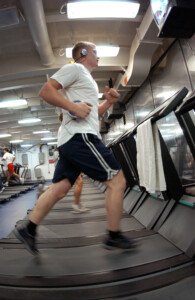
What type of anxiety and depression responds best to exercise for those who don’t want to take medications?
Unfortunately, most doctors prescribe drugs as the first line of treatment for anxiety or depression.
Exercise, however, causes no negative side effects and can be quite effective as a long-term treatment.
“Society needs to think of anxiety and depression as a medical illness, similar to chronic diseases like diabetes,” says Patricia Celan, MD, a senior psychiatry resident at Dalhousie University in Canada.
“In severe cases of depression and anxiety, like with cases of type 1 or severe type 2 diabetes, medication cannot be avoided — lest the consequences be fatal.
“However, in milder cases of depression, anxiety or mild type 2 diabetes, the illness can actually be reversed by healthy lifestyle choices – including diet, coping skills and exercise.
“This may be especially favorable if someone wants to avoid the potential side effects of medications.
“Research has repeatedly found that engaging in exercise on a regular basis reduces stress, boosts mood and has an almost immediate anti-anxiety effect.
“The cause of this is the release of endorphins and can be just as effective for treating anxiety as some common anxiety medications such as Ativan.
“Aerobic exercise has the greatest impact, and can reduce symptoms of anxiety and depression for a few hours – and longer, if people are engaging in the exercise consistently.”
A Study You Should Know About
Dozens of population-based studies, meta-analytic reviews and clinical investigations were analyzed by Smits et al, of the Anxiety Research and Treatment Program at Southern Methodist University, Dallas.
Drugs and cognitive behavioral therapy (CBT) aren’t practical for everybody, and this is especially where exercise comes in as a highly effective, safe treatment for depression and anxiety.
Obstacles to medications may be lack of insurance coverage, plus side effects, and obstacles to CBT may be the cost, as well as having to work with the therapist; a patient may want to remain private about their condition.
However, exercise can also be of great value to patients who do choose to take medications and/or CBT.

The study found that those who exercised reported fewer symptoms of depression or anxiety, plus lower levels of anger and stress.
In addition to affecting brain chemistry in a positive way, regular workouts boost self-confidence, a feeling of accomplishment and also promote goal setting.
How much exercise?
The study encourages building up to 150 minutes a week of medium intensity aerobics.
This is the same guideline set by the Department of Health and Human Services.
If you want to start off with less time, the DHHS also recommends 75 minutes/week of vigorous activity.
What is medium intensity?
You can carry on a conversation, but your heart rate and respiration are elevated.
What is vigorous?
You cannot carry on a conversation, and heart rate is notably elevated. Breathing is heavy.
Before you try medication for your depression or anxiety – even if you have both – try some exercise, even if you feel “out of shape” or are overweight or a smoker.


 Dr. Celan
Dr. Celan
























